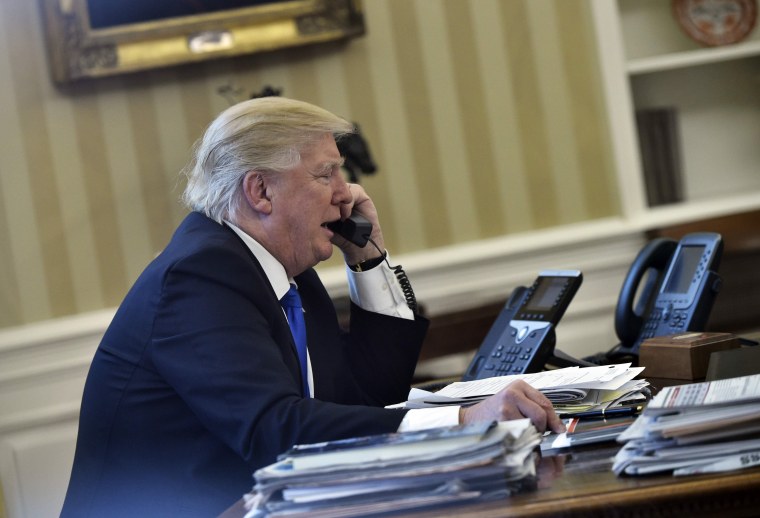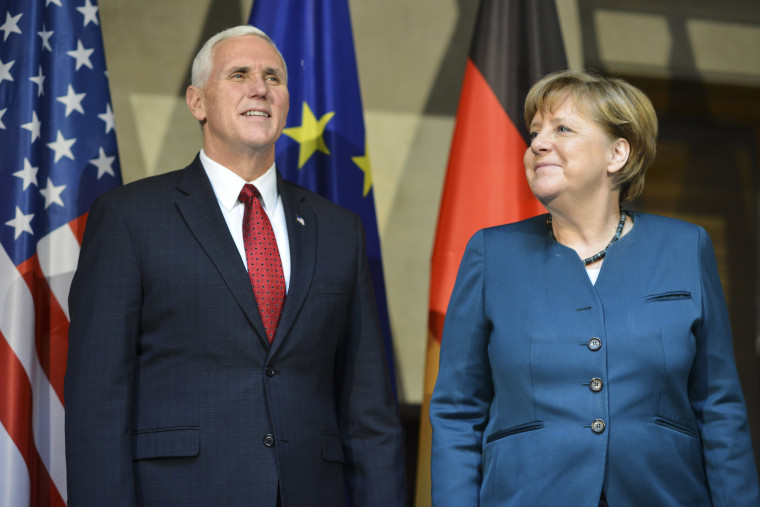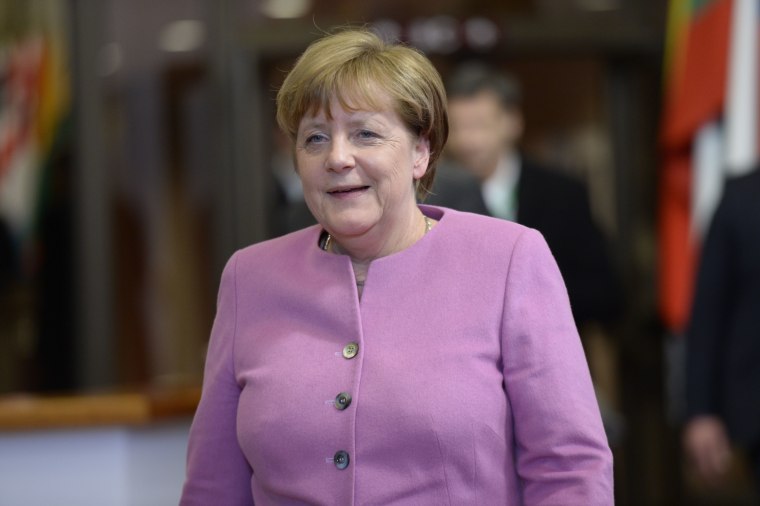It's no secret that German Chancellor Angela Merkel and President Donald Trump have a tense history. The two leaders have clashed publicly — with Trump harshly criticizing Merkel's handling of the Syrian refugee crisis — and they have divergent views on the roles their nations should play on the world stage.
However, when the two leaders meet on Friday, White House officials say they will work to put aside differences to work to better strengthen both transatlantic relations and their own.

"If any European leader can be assumed to have profound insights into (Putin’s) thinking and psychology, but at the same time have a very hard-nosed attitude toward a strategic goal, then it would be Merkel," Constanze Stelzenmüller, Robert Bosch senior fellow at the Brookings Institution, told NBC News.
White House officials have downplayed Trump's campaign trail criticism of Merkel, opting instead for an optimistic preview of the meetings to come.
Related: All the attacks Trump leveled against Merkel
The president was "impressed by" Merkel's leadership, an administration official told reporters during a background briefing held ahead of the leaders' meeting. The officials said they looked forward to cooperating on issues of counter terrorism and trade and expect President Trump to express his appreciation for Germany's "deep friendship" with the United States when he meets with Merkel.
Berlin also preached cautious optimism ahead of the meeting, calling the visit an opportunity for the two administrations to get to know each other and saying that Merkel was going in with an open mind.
German officials see the trip not just as a chance for the leaders to physically talk with each other rather than about each other, but also as an opportunity to prepare for the upcoming G20 meeting in Hamburg this July and the G7 Summit in May, foreign policy experts said.
German Institute for International and Security Affairs Senior Fellow Susanne Dröge shares the same view.
"The good news is that they meet," Dröge told NBC News ahead of the meeting.
Dröge described Merkel as "very structured...clear cut and reliable."
"So really the opposite" of President Trump," Dröge said.
But opposite styles may not stop the relationship from bearing fruit. The two leaders could find common interest in Russian President Vladimir Putin, for example.
Putin and Russia
Merkel brings with her a skill that Trump does not possess: experience in dealing with Russian President Vladimir Putin, foreign policy experts point out. That unique insight is of interest to the president, who one administration official said "will be very interested in hearing the chancellor's views on her experience interacting with Putin."
Trump has been outspoken about his interest in bettering relations with the Kremlin, often asking crowds on the campaign trail why it would be so bad to get along better with Russia.
Stelzenmüller says Merkel "probably knows Putin better than anybody" and could give Trump a sense of the Russian leader's goals and tactics.
"This is how its been with him, this is how he works, this is how he tries to gain your trust, this is how he tries to keep you on edge. These are his goals and this is his modus operandi. This is the thing she has twelve years of experience with as Chancellor," she said.
Merkel's understanding of Putin could be a boon in negotiations over Ukraine, a topicWhite House officials expect to come up during Friday's meeting. President Trump recognizes France and German leadership on the Ukraine issue, officials said, but declined to telegraph his thinking on the issue any further.
Instead of a chance to achieve specific desires in Ukraine, Trump's team sees the meeting as a chance for Trump to understand "the dynamics" of the ongoing negotiating process and to better flesh out what role the U.S. can play in deciding the issue.
Refugees
The root of Trump's quarrel with Merkel was her decision to allow a surge of refugees from war-torn countries into Germany.
After seeing her party rocked by the results of the September 2016 election, Merkel said "if I was able to, I would turn back time by many, many years, so that I could have prepared the whole government and the authorities for the situation which hit us out of the blue in the late summer of 2015."
Merkel signaled openness to changing Germany's open-door policy should the German people signal that desire, but made clear her personal stance on the issue was not to discriminate.
Still, the German chancellor has remained at odds with Trump over his own prescriptions to curb the flow of refugees into the United States.
Speaking by phone with the president in the immediately after Trump signed the first version of his travel ban, Merkel spokesman Steffen Seibert said in a statement that the German leader "explained" refugee convention requirements, among them that the international community take in war refugees on humanitarian grounds.
“She is convinced that the necessary, decisive battle against terrorism does not justify a general suspicion against people of a certain origin or a certain religion," Seibert said in a statement.
A White House readout of the same call made no mention of the immigration ban being discussed.
Last week, a White House official said he expects the issue to come up but that the two leaders have already spoken on the phone and at this point, it's a question of how to "move forward" on the issue.
With few tangible policies to expect deliverance on, the truest measure of the meeting will likely come during a planned joint press conference.
It is the fourth time Trump has fielded questions side by side with a world leader — the United Kingdom's Theresa May, Canada's Justin Trudeau, and Japan's Shinzo Abe have all joined Trump for press conferences since his White House tenure began.
Climate
Germany could look to Trump on issues like the Paris Climate Agreement, which Dröge says would signal intentions for further international collaboration. The agreement marks a global commitment to combating climate change, but could be in jeopardy of the U.S. pulling out.
The decision comes at a time when Trump's own Environmental Protection Agency administrator says he's not sure that carbon dioxide is a primary contributor to global warming.
Sources close to Trump and those within the White House have previously signaled that the president will pull out of the agreement, reversing one of President Barack Obama's lasting works on climate change.
But last week, White House officials declined to get out in front of the president on this issue, noting that it would possibly be brought up by the German chancellor but that "internally the United States is still working on that issue."
The European Union
There's also the question of the role of the European Union (EU) in the wake of the Brexit vote for the U.K. to leave the bloc last summer.
Trump congratulated himself during the campaign for predicting the outcome of the Brexit vote, and has sought counsel from "leave" proponents such as Britain's Nigel Farage during the campaign, transition, and now in the White House. Farage, the former leader of the U.K. Independence Party, is known for his anti-immigrant stance and for being a prominent purveyor in the push for Britain to leave the EU.
But the White House has already laid the groundwork to assure Merkel and the EU that they are committed to the relationship. Merkel met with Vice President Mike Pence last month in Munich, where White House officials say he gave a "clear message" that the United States will maintain its "strong enduring partnership" with the EU and recognize its "significant contributions to global peace and prosperity."

NATO Spending
White House officials did walk the president's hard line on NATO defense payments, repeating that the burden must be shared among partners and that the White House is "heartened" by Germany's commitment to ratchet up its spending to 2 percent of GDP by 2024.
German officials stress this call for more spending is nothing new, but remain committed to the above spending goals outlined in 2014 at the Nato Wales summit.
While in Munich last month, Vice President Pence targeted countries who "do not have a credible path" toward paying their share of the NATO burden.
"The time has come to do more," he said, signaling Germany, France, and Italy to increase spending without naming them outright. At that same conference, Merkel made clear that Germany would not be bullied over this spending and that they'd already promised to ratchet up their monetary commitment.

